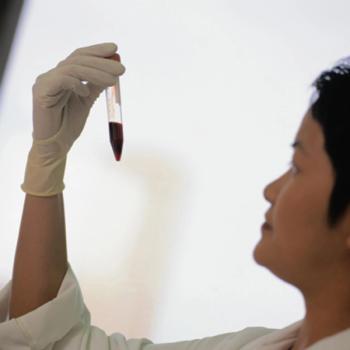
A shortage of genetic counselors inspired researchers to find a way to streamline testing to prevent delays in treatment for patients with ovarian cancer who require BRCA testing.


A shortage of genetic counselors inspired researchers to find a way to streamline testing to prevent delays in treatment for patients with ovarian cancer who require BRCA testing.

CE lesson worth 1 contact hour that is intended to advanced practice nurses, registered nurses, and other healthcare professionals who care for patients with cancer.

The Food and Drug Administration (FDA) approved Rubraca (rucaparib) as a maintenance therapy for women with recurrent epithelial ovarian, fallopian tube or primary peritoneal cancer who are in complete or partial response to platinum-based chemotherapy, according to Clovis Oncology, the company that manufactures the drug.

The FDA has granted priority review to a supplemental biologics license application for Pembrolizumab (Keytruda) for the treatment of advanced cervical cancer with disease progression on or after chemotherapy.

A drug used to treat leukemia may also have potential in treating small cell carcinoma of the ovary, hypercalcemic type (SCCOHT).

As part of a multidisciplinary team, nurses often reference guidelines to assist in treatment decisions for patients with cancer. Now, they also have guidance on how to treat individuals that comprise an underserved population of patients: those living with HIV and cancer.

Hyperthermic intraperitoneal chemotherapy (HIPEC), also known as hot chemotherapy bath, has been shown to improve survival rates by 10%, according to study results recently published in the New England Journal of Medicine.

A study done at SUNY Downstate Hospital found that black women of Caribbean descent with type I or type II endometrial cancer expressed significant differences in genetic variations when compared with a nationwide population of patients with endometrial cancer.

Screening for ovarian cancer in asymptomatic women who are not known to have a high-risk hereditary cancer syndrome has no benefit and may lead to harm due to false positives, according to a new review conducted by the US Preventive Services Task Force (USPSTF).

The BD Onclarity HPV Assay can detect up to 14 types of high-risk human papillomavirus (HPV) and identify genotypes that are strongly associated with cervical cancers.

Immunotherapy alone has not shown much success in treating ovarian cancer, despite success with other cancers, so researchers are now testing combinations of immunotherapy drugs with other agents to see if it enhances effectiveness.

Cisplatin, a platinum-based chemotherapy agent that is used to treat testicular cancer, non-small cell lung cancer, bladder cancer, cervical cancer, ovarian cancer and head and neck cancer, has been found to cause a significant amount of hearing loss in patients, according to a recent article published in Nature Communications.

Blueberries are known as a "superfood" because of the rich essential vitamins and minerals they provide. Research now shows they may also help to treat cancer.

Oliver Dorigo, M.D., Ph.D., Associate Professor of Obstetrics and Gynecology (Oncology), Stanford University Medical Center, discusses the work ahead in the ovarian cancer field.

PARP inhibitor Rucaparib may soon be available to a wider group of patients with ovarian cancer.

Oliver Dorigo, M.D., Ph.D., Associate Professor of Obstetrics and Gynecology (Oncology), Stanford University Medical Center, discusses recent exciting developments in the ovarian cancer field.

Current diagnostic measures for ovarian cancer are not extremely reliable. In an effort to diagnose the disease earlier, researchers are working on a blood test that can detect ovarian cancer

The FDA announced today that it has approved the first biosimilar for the treatment of multiple types of cancer.

A California woman has been awarded $417 million after alleging that Johnson & Johnson’s talcum-based Baby Powder led to ovarian cancer. The jury award may be the largest yet concerning the product.

Lynparza tablets (olaparib) tablets were granted FDA approval as a maintenance therapy for patients with recurrent epithelial ovarian, fallopian tube or primary peritoneal cancer, who are in a complete or partial response to platinum-based chemotherapy.

Ovarian cancer expert, David M. Gershenson, MD, from University of Texas MD Anderson Cancer Center discusses three treatments for some of the rare types of ovarian cancers and the challenges to treating these diseases.

Ovarian cancer screening for women who do not have symptoms of the disease may do more harm than good, according to the USPSTF.

The treatment landscape of ovarian cancer continues to change with the recent approvals of new agents.

For women with ovarian cancer, the message is clear: participating in clinical trials, even early-phase ones, offers the best hope for better treatments, but efforts are urgently needed at every level to ensure that more of these research opportunities are available.

Maintenance rucaparib may improves progression-free survival in patients with ovarian cancer.